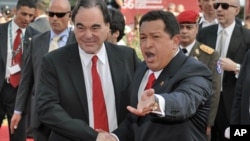Academy award winning filmmaker Oliver Stone, known for his controversial take on political figures such as George W. Bush and Richard Nixon, and on historic events such as the assassination of John F. Kennedy, has released yet another controversial documentary.
"South of the Border" throws a glowing light on Venezuelan President Hugo Chavez, arguing that he has been portrayed unfavorably by the U.S. media.
Positive light
In the film, Stone presents Chavez as a leader who rose from the ranks of the poor to become a democratically-elected president. Chavez emerges as a charismatic and beloved figure who defies American interventionism, creates a robust domestic economy and triumphs over - as Stone charges - an American-backed coup in 2002.
But Stone's attempt to create a provocative film falls flat. It does not provide any proof of a U.S. plot against the Venezuelan leader, nor any proof that Chavez's initiative to nationalize his country's natural resources has improved the country's economy.
Quite the contrary, says Michael Shifter, president of the Inter-American Dialogue, a Washington-based think tank for policy analysis. According to Shifter, Venezuela has gotten poorer over the last four years. Its oil production has decreased and inflation has increased dramatically.
Economic woes
"Highest inflation by far in Latin America," says Shifter. "It could be over 40 percent this year, was 30 percent last year. Inflation hurts the poorest people. Crime. The statistics on crime are very troubling in all of Latin America. In Venezuela, they are off the charts."
Stone's film does not address Venezuela's socio-economic woes. Instead, he picks on the U.S. media for vilifying Chavez as a dictator and demagogue.
"I just think that was not a fair representation of the U.S. press," says Shifter. "That's not to say that there isn't room for criticism. But to say that is all one-sided, I think that doesn't reflect the reality."
Like Stone, Shifter acknowledges that Mr. Chavez was democratically elected, has a popular base, is hard working and cares for his constituents. But Shifter questions whether his rule is democratic.
"He makes all the decisions. There are no constraints on his power. He controls the judicial branch. To say that the judicial branch is independent is a joke. There's certainly been a lot of problems about the press, of his control of the press. Human rights abuses are clear. There are people that are in jail simply because of their disagreements with Chavez."
'South of the Border'
Tariq Ali, a British-Pakistani historian co-wrote "South of the Border." During an event for the film's promotion, he spoke about alleged human rights abuses in Venezuela.
"As to whether there may be some human rights violations, probably. I can't say there aren't any," says Ali.
This, too, is an issue that the film does not cover. Instead, Stone focuses on Chavez as a a leader who aspires to follow in Simon Bolivar's footsteps, to create a Latin America united against U.S. intervention.
Stone says his film was received enthusiastically in Latin America.
"We had 6,000 Bolivarians cheering, 3,000 Venezuelans, 2,000 Equadorians. It was beautiful to see," says Stone. "This is an ongoing thing. This is not just a movie. It's a movement to carry through. North America is very interested in destabilizing these countries."
Stone's cinematography also leaves a lot to be desired.
Too many sugar-coated moments of male bonding between the filmmaker and the Venezuelan leader beg the question: What is this film about? A budding friendship between two colorful personalities basking in controversy or historic truth?





